Bank-Robber-Turned-Law-Prof Lands a Starring Role in Criminal Justice Reform
Georgetown law professor Shon Hopwood discusses how he got involved in the Trump administration's criminal justice reform efforts and how his fellow legal academics feel about his working alongside the White House.
April 02, 2019 at 02:14 PM
6 minute read
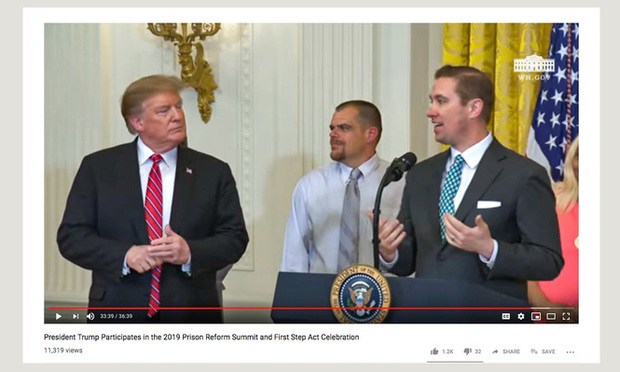 Georgetown University Law Center professor Shon Hopwood, far right, speaks at a White House celebration of the First Step Act on April 1.
Georgetown University Law Center professor Shon Hopwood, far right, speaks at a White House celebration of the First Step Act on April 1.
Shon Hopwood's improbable journey from federal inmate to professor at Georgetown University Law Center hit another high this week when President Donald Trump—during a White House celebration Monday—credited the convicted bank robber with helping enact a major federal criminal reform bill.
It was Hopwood's second big moment at 1600 Pennsylvania Avenue in mere months. He attended the signing of the First Step Act on Dec. 21 and spoke briefly, but the White House held another celebration of its criminal justice reform successes this week because the original bill signing was overshadowed by the partial government shutdown. Hopwood spent 11 years in federal prison, where he was a prolific jailhouse attorney, before going on to law school and the legal academy.
Trump called Hopwood to the podium after remarks from five people who had been released from federal prison under the new law, which is a series of prison and sentencing reforms expected to free about 4,000 prisoners. It enjoyed widespread, bipartisan support in Congress. Among the other speakers was 52-year-old Matthew Charles, who spent 21 years in prison for drug and gun possession. Charles was an exemplary prisoner and was released in 2016 but was sent back to prison last May after authorities determined that his release was a mistake. He left prison for a second time in January. Hopwood, along with celebrities such as Kim Kardashian and lawmakers, called for his release.
Law.com caught up Hopwood the day after his latest White House appearance to discuss criminal justice reform, how he got involved with the Trump administration, and what his colleagues think about his alliance with the president. His answers have been edited for length.
It seems that you've become a White House regular over the past two years. Is that right? I've gone over there a lot. It's not something I ever planned on, but I've been working with the Trump administration on criminal justice reform and particularly on the First Step Act. They've got some other things that will be coming up that I'm trying to work with them on, as far as trying to get people out of federal prison.
Is it still exciting to roll up to the White House, or are you blasé about it at his point? No, I always feel that way. I feel the same way whether I'm going to the White House, the Senate offices, the Supreme Court—all those place where I just get to walk in. It's an interesting experience, especially with my background.
So you never envisioned that you would be spending a lot of time at the White House? No, but I never envisioned I'd be a tenure-track law professor at Georgetown with an office that's a block from the headquarters of the Federal Bureau of Prisons—or a lawyer for that matter, because I had about 300 lawyers telling me I would never be able to become a lawyer. It's unbelievable. And it's even unbelievable to me, and I've been living it.
You've been working with Trump, who is not the most popular guy in the legal academy. Do you get flack from colleagues about that? There are people who get upset with me for working at the White House. It's not really law professors so much as the general public, but I find a lot of people—even though they are smart and understand complex ideas—can't understand that I can work with the White House on this one issue while not necessarily agreeing with everything else that they do. I tell people that I will work with anyone who wants to do meaningful criminal justice reform.
I don't share a lot of the administration's views on things like immigration. But I can't change that. But if they are willing to relook at criminal justice reform, I certainly want to be a part of those discussions. I will say this: They have been really good on this issue—in a way that I did not fully anticipate when President Trump was elected to office.
While introducing you, the president mentioned that his daughter Tiffany is one of your students. (You assured him that she's a good student.) Is that how the White House connection came about? No. In fall of 2017, 60 Minutes did an episode on me, and the White House watched that. That's when they started inviting me over to talk about federal criminal justice reform policy. It wasn't until after that when I had interactions with Tiffany at the law school. Out of all of them, I have probably spent the most time around Jared Kushner.
That's right, Kushner has been the point person on criminal justice reform. How much credit do you give him for making the First Step Act happen? Outside of the politicians who voted for First Step, I don't think anyone has been as important to this as he has been. He's like so many Americans, though. You don't think about the criminal justice system until you are directly impacted. His dad went to federal prison, and he remembered what that was like. That's what motivates him to do this work.
You now have a behind-the-scenes look at how legislation comes together. Is that something you are sharing with your students? Yes. I taught a prison law and policy class in the fall with 70 students. One of the things I talked a lot about was criminal justice reform. What are the Supreme Court doctrines that say what rights people retain when they are in prison? The other half of the class is: assuming there is no law, how can we fix the prison system?
Next fall, I'm teaching a seminar on criminal justice reform, and I'll bring in guest speakers and teach students everything from how to write and op-ed to substance on how to reform sentencing. My students generally like to hear about current events.
Think you can you get Matthew Charles into the classroom? I actually had him at the law school a couple weeks ago. He mostly met faculty and the dean, and we did a Facebook Live event with the communications team, but he'll probably come back. He's such a neat guy. He's my former client, but he has quickly turned into a good friend of mine.
This content has been archived. It is available through our partners, LexisNexis® and Bloomberg Law.
To view this content, please continue to their sites.
Not a Lexis Subscriber?
Subscribe Now
Not a Bloomberg Law Subscriber?
Subscribe Now
NOT FOR REPRINT
© 2025 ALM Global, LLC, All Rights Reserved. Request academic re-use from www.copyright.com. All other uses, submit a request to [email protected]. For more information visit Asset & Logo Licensing.
You Might Like
View All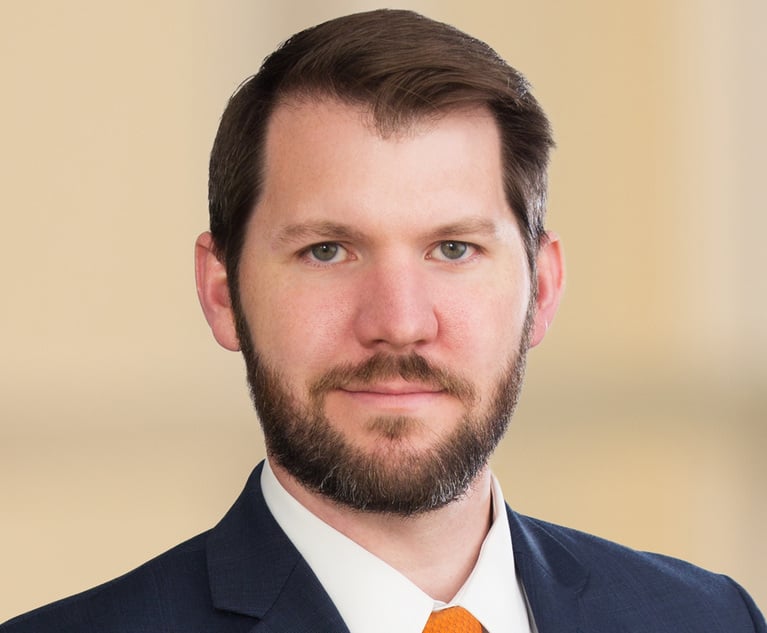
How I Made Office Managing Partner: 'Don’t Be an Opportunity Killer,' Says Thomas Haskins of Barnes & Thornburg
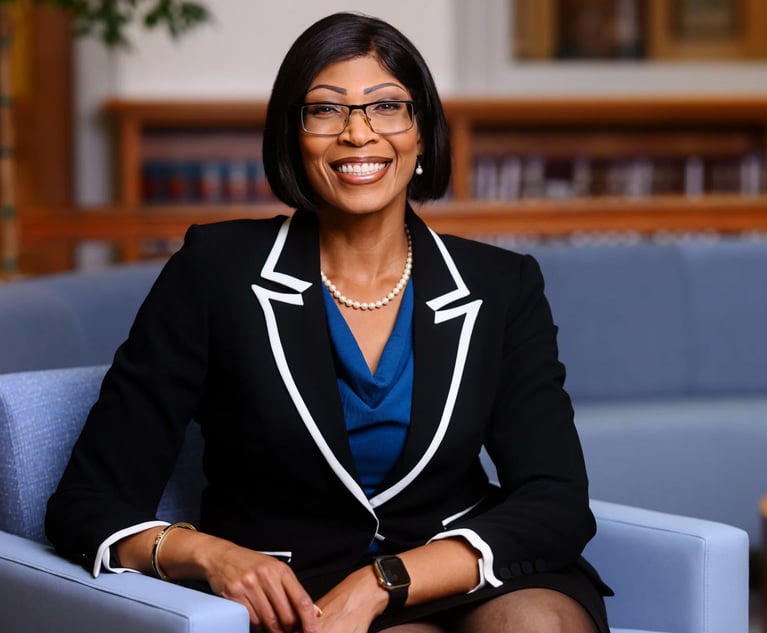
Retention, Development and 'Empowering Teams': This Am Law 200 Firm's Newest Practice Leader Says Objectives Haven't Changed
6 minute read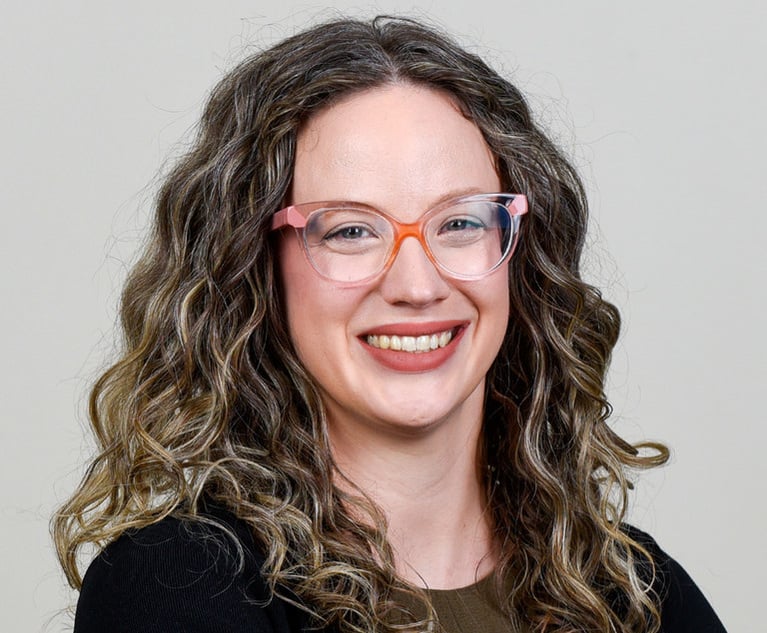
How I Made Partner: 'Take Every Opportunity to Get Involved in the Business Side of the Firm,' Says Alyssa Domzal of Ballard Spahr
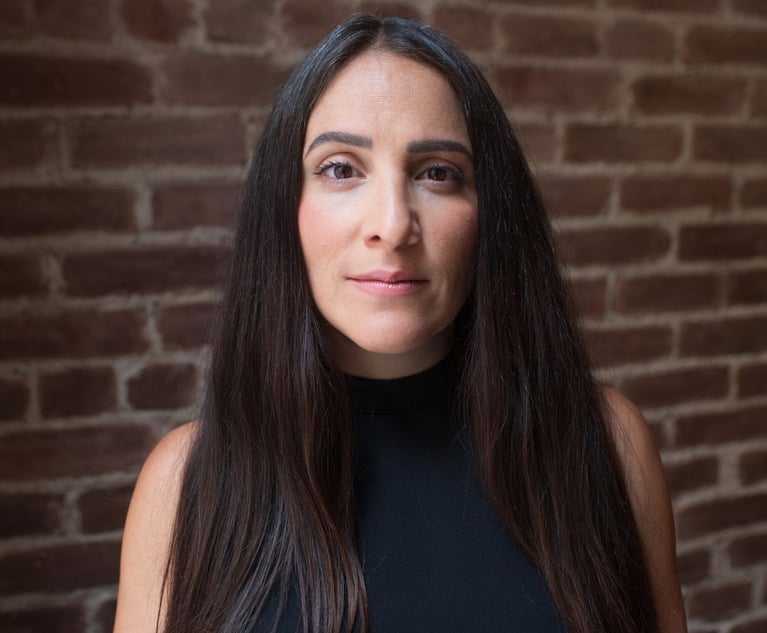
How I Made Practice Group Chair: 'Cultivating a Culture of Mutual Trust Is Essential,' Says Gina Piazza of Tarter Krinsky & Drogin
Trending Stories
- 1Parties’ Reservation of Rights Defeats Attempt to Enforce Settlement in Principle
- 2ACC CLO Survey Waves Warning Flags for Boards
- 3States Accuse Trump of Thwarting Court's Funding Restoration Order
- 4Microsoft Becomes Latest Tech Company to Face Claims of Stealing Marketing Commissions From Influencers
- 5Coral Gables Attorney Busted for Stalking Lawyer
Who Got The Work
J. Brugh Lower of Gibbons has entered an appearance for industrial equipment supplier Devco Corporation in a pending trademark infringement lawsuit. The suit, accusing the defendant of selling knock-off Graco products, was filed Dec. 18 in New Jersey District Court by Rivkin Radler on behalf of Graco Inc. and Graco Minnesota. The case, assigned to U.S. District Judge Zahid N. Quraishi, is 3:24-cv-11294, Graco Inc. et al v. Devco Corporation.
Who Got The Work
Rebecca Maller-Stein and Kent A. Yalowitz of Arnold & Porter Kaye Scholer have entered their appearances for Hanaco Venture Capital and its executives, Lior Prosor and David Frankel, in a pending securities lawsuit. The action, filed on Dec. 24 in New York Southern District Court by Zell, Aron & Co. on behalf of Goldeneye Advisors, accuses the defendants of negligently and fraudulently managing the plaintiff's $1 million investment. The case, assigned to U.S. District Judge Vernon S. Broderick, is 1:24-cv-09918, Goldeneye Advisors, LLC v. Hanaco Venture Capital, Ltd. et al.
Who Got The Work
Attorneys from A&O Shearman has stepped in as defense counsel for Toronto-Dominion Bank and other defendants in a pending securities class action. The suit, filed Dec. 11 in New York Southern District Court by Bleichmar Fonti & Auld, accuses the defendants of concealing the bank's 'pervasive' deficiencies in regards to its compliance with the Bank Secrecy Act and the quality of its anti-money laundering controls. The case, assigned to U.S. District Judge Arun Subramanian, is 1:24-cv-09445, Gonzalez v. The Toronto-Dominion Bank et al.
Who Got The Work
Crown Castle International, a Pennsylvania company providing shared communications infrastructure, has turned to Luke D. Wolf of Gordon Rees Scully Mansukhani to fend off a pending breach-of-contract lawsuit. The court action, filed Nov. 25 in Michigan Eastern District Court by Hooper Hathaway PC on behalf of The Town Residences LLC, accuses Crown Castle of failing to transfer approximately $30,000 in utility payments from T-Mobile in breach of a roof-top lease and assignment agreement. The case, assigned to U.S. District Judge Susan K. Declercq, is 2:24-cv-13131, The Town Residences LLC v. T-Mobile US, Inc. et al.
Who Got The Work
Wilfred P. Coronato and Daniel M. Schwartz of McCarter & English have stepped in as defense counsel to Electrolux Home Products Inc. in a pending product liability lawsuit. The court action, filed Nov. 26 in New York Eastern District Court by Poulos Lopiccolo PC and Nagel Rice LLP on behalf of David Stern, alleges that the defendant's refrigerators’ drawers and shelving repeatedly break and fall apart within months after purchase. The case, assigned to U.S. District Judge Joan M. Azrack, is 2:24-cv-08204, Stern v. Electrolux Home Products, Inc.
Featured Firms
Law Offices of Gary Martin Hays & Associates, P.C.
(470) 294-1674
Law Offices of Mark E. Salomone
(857) 444-6468
Smith & Hassler
(713) 739-1250








